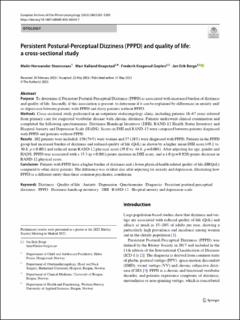| dc.contributor.author | Steensnæs, Malin Herwander | |
| dc.contributor.author | Knapstad, Mari Kalland | |
| dc.contributor.author | Goplen, Frederik Kragerud | |
| dc.contributor.author | Berge, Jan Erik | |
| dc.date.accessioned | 2023-12-22T10:14:24Z | |
| dc.date.available | 2023-12-22T10:14:24Z | |
| dc.date.created | 2023-06-16T14:16:18Z | |
| dc.date.issued | 2023 | |
| dc.identifier.citation | European Archives of Oto-Rhino-Laryngology. 2023, . | en_US |
| dc.identifier.issn | 0937-4477 | |
| dc.identifier.uri | https://hdl.handle.net/11250/3108766 | |
| dc.description.abstract | Purpose:
To determine if Persistent Postural-Perceptual Dizziness (PPPD) is associated with increased burden of dizziness and quality of life. Secondly, if this association is present, to determine if it can be explained by differences in anxiety and/or depression between patients with PPPD and dizzy patients without PPPD.
Methods:
Cross-sectional study performed in an outpatient otolaryngology clinic, including patients 18–67 years referred from primary care for suspected vestibular disease with chronic dizziness. Patients underwent clinical examination and completed the following questionnaires: Dizziness Handicap Inventory (DHI), RAND-12 Health Status Inventory and Hospital Anxiety and Depression Scale (HADS). Scores in DHI and RAND-12 were compared between patients diagnosed with PPPD and patients without PPPD.
Results:
202 patients were included. 150 (74%) were women and 37 (18%) were diagnosed with PPPD. Patients in the PPPD group had increased burden of dizziness and reduced quality of life (QoL) as shown by a higher mean DHI score (49.2 vs. 30.8; p < 0.001) and reduced mean RAND-12 physical score (39.0 vs. 44.6; p = 0.004). After adjusting for age, gender and HADS, PPPD was associated with a 15.3 (p < 0.001) points increase in DHI score, and a 4.0 (p = 0.020) points decrease in RAND-12 physical score.
Conclusion:
Patients with PPPD have a higher burden of dizziness and a lower physical health-related quality of life (HRQoL) compared to other dizzy patients. The difference was evident also after adjusting for anxiety and depression, illustrating how PPPD is a different entity than these common psychiatric conditions. | en_US |
| dc.language.iso | eng | en_US |
| dc.publisher | Springer | en_US |
| dc.rights | Navngivelse 4.0 Internasjonal | * |
| dc.rights.uri | http://creativecommons.org/licenses/by/4.0/deed.no | * |
| dc.title | Persistent Postural-Perceptual Dizziness (PPPD) and quality of life: a cross-sectional study | en_US |
| dc.type | Peer reviewed | en_US |
| dc.type | Journal article | en_US |
| dc.description.version | publishedVersion | en_US |
| dc.rights.holder | © The Author(s) 2023 | en_US |
| dc.source.pagenumber | 5285–5292 | en_US |
| dc.source.volume | 280 | en_US |
| dc.source.journal | European Archives of Oto-Rhino-Laryngology | en_US |
| dc.identifier.doi | 10.1007/s00405-023-08040-7 | |
| dc.identifier.cristin | 2155308 | |
| cristin.ispublished | true | |
| cristin.fulltext | original | |
| cristin.qualitycode | 1 | |

